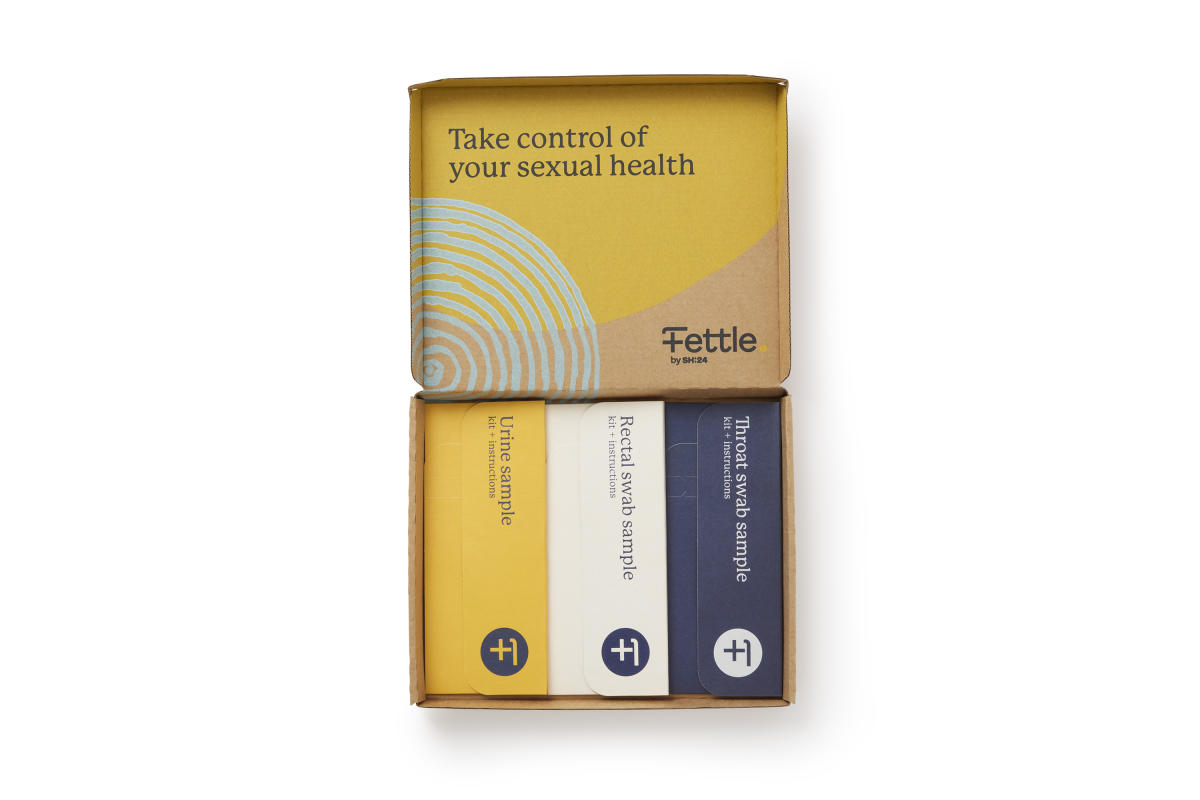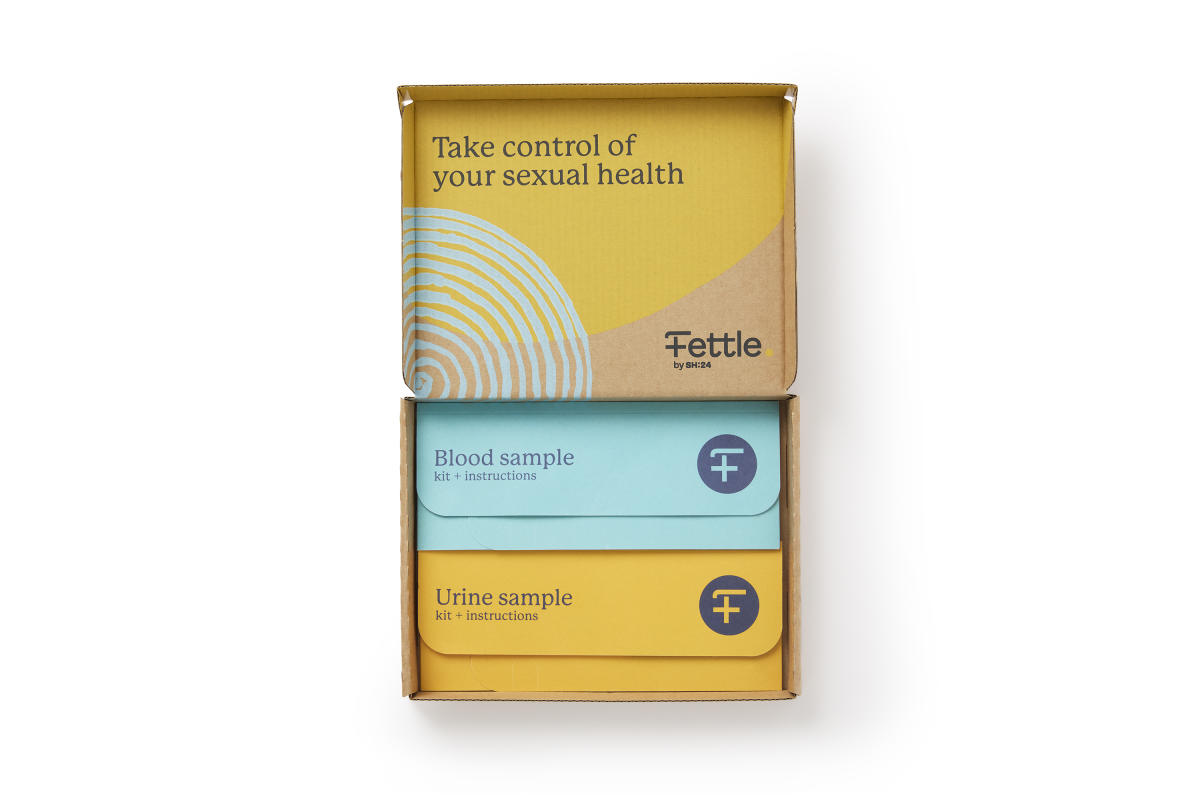
Gonorrhoea test
Swab or urine test

Choose a vaginal swab or urine sample test kit when you order
Test for gonorrhoea and chlamydia with one test, at no extra cost


Test at least 2 weeks after unprotected sex for most accurate results
Get your results by text within 72 hours of your sample arriving at the lab.

Gonorrhoea can be spread by unprotected vaginal, anal and oral sex.
You can add tests for other infections to your basket before completing your order.
Other gonorrhoea tests available
£83.70
Test for all 3 types of chlamydia and gonorrhoea - oral, rectal and genital - in 1 order
£120.80
Test for 6 STIs: gonorrhoea, chlamydia, hepatitis B, hepatitis C, HIV & syphilis
What happens next

Free discreet delivery
We’ll deliver your order by 1st Class post in discreet packaging.

Test at home
You'll get everything you need in the test kit. Follow the simple steps and post your samples to our lab in the Freepost box.

Results and support by text
We’ll send your results within 72 hours of your samples arriving at our lab. Get support by text whenever you need it. Our clinicians are here to help.

Support whenever you need it
If you have a positive result, our clinical team will help you access treatment locally.
What our users say
Exceptional service and really fast results. The tests are so easy to use as well
In one word brilliant
Great website. Love the products and the communication from the company regarding the order. Grateful for the discretion upon delivery and will use this website again if need be.
What's in the gonorrhoea self-test kit?
To test at home you’ll take a swab from your mouth, anus or vagina. Or you can send a urine sample. You’ll find an instruction card in your kit. Read the instructions carefully so your tests are accurate.

Urine sample
Use this to test for genital gonorrhoea. Pee into the sample tube then screw the lid on tightly.
Vaginal swab
Use this to test for genital gonorrhoea. Gently wipe the soft cotton tip of the swab around the walls of your vagina.

Rectal swab
Use this to test for gonorrhoea in your bottom (anus). Gently insert the soft cotton tip of the swab into your anus and rotate it for about 10 seconds. Take care not to snap the swab.
Oral swab
Use this to test for gonorrhoea in your throat. Sweep the soft cotton swab around the back of your mouth and throat, where your tonsils are.
Sample tubes and return box
It’s easy to return your samples safely. Put each sample in its protective tube and use the Freepost box to send your samples to our lab.
Gonorrhoea: the basics
When to test for gonorrhoea
It can take up to 2 weeks (14 days) after sexual contact for a gonorrhoea infection to show up in a test. If you test before this, your test will not be accurate.
Most people have no symptoms, so you may not know that you have an infection. We recommend testing when you have a new sexual partner. If you change partners regularly, test every 3 months (12 weeks). And if you do not change partners regularly, test once a year.
How to reduce your risk of gonorrhoea
Gonorrhoea is passed from one person to another through oral, vaginal or anal sex. You won’t get it from kissing, hugging, sharing towels or baths, as the bacteria do not survive outside the body for very long.
Condoms are the best way to protect yourself from gonorrhoea. Test regularly to make sure you’re not passing on the infection without knowing it.
Getting treatment for gonorrhoea
Gonorrhoea is treated with an antibiotic injection. If you get a positive result, we’ll help you get treatment from your nearest clinic.
You should tell all of your sexual partners from the last 6 months. They could have gonorrhoea without knowing it. If you test positive, we’ll send you a link to our anonymous partner notification service. We make it easier to tell your sexual partners so they can get tested and treated.
How accurate are the STI tests?
Our simple home STI test kits are highly accurate when you:
wait the recommended window period before you test
follow the kit instructions carefully
complete additional tests in a clinic setting, if recommended by our clinicians.
Your samples are sent to our partner laboratory to be processed by specialist technicians. We use similar tests that are used by many NHS clinics.
If you are experiencing any STI symptoms, you should visit your local sexual health clinic for further testing and examination.
Do you need help with something else?
Find your local sexual health clinic.
Find out where you can access medication to reduce your chance of becoming infected with HIV. It must be started within 3 days of exposure.
Find out about your emergency contraceptive options.





